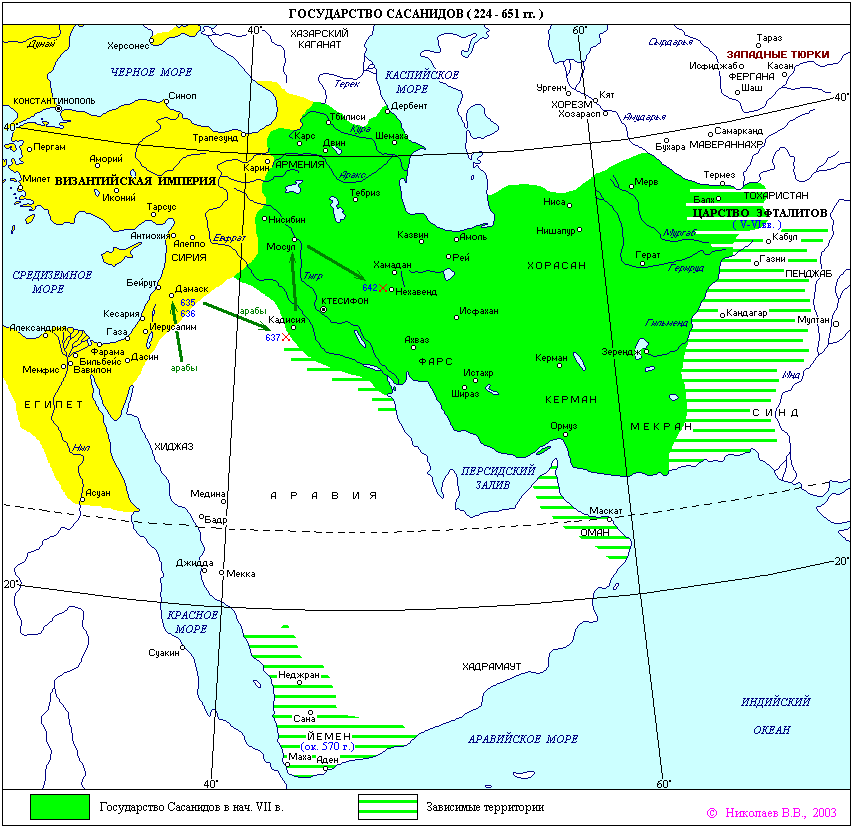During the Roman occupation of Palestine, Jews began moving to other parts of the Empire and its edges. Rome didn’t rule Arabia proper, but its province of Arabia Petraea included the legendary town of Petra and its trade routes. After the Jewish revolt and destruction of Jerusalem in 70 AD, many Jews fled in all directions, including eastward into nearby Arabia. There are some Jewish tombs in north-western Arabia that date back to Roman times.
During the 4th century, many Arabian petty kings and tribal leaders adopted either Judaism or Christianity. In one story, some rabbis with Torah scrolls were not harmed by fire, and so the South Arabian kingdom of Himyar (a successor to Saba) became Jewish. Regardless of who converted to Judaism, Jewish families settled in Arabian towns and grew to become extended-family tribes in the Arabian manner. By the time of Muhammad, on the surface it was impossible to tell which “Jewish” tribes were originally from Israel but spoke Arabic, as opposed to being Arabs who had adopted Judaism. Some towns and even kingdoms were mostly Jewish, especially in the South, where Yemen’s Jewish communities have been famous in modern times.
Christianity’s first inroad to Arabia was its 3rd and 4th century love affair with deserts, where hermits could live truly holy lives away from temptation. Christian Egypt began the hermit tradition in its western desert, but monasteries spread to other deserts. St. Catherine’s Monastery in Sinai was built during the generation before Mohammad.
Around the same time, Emperor Justinian founded a monastery in Saidnaya, Syria.
These flagship monasteries had many other hermitages and smaller retreats all through the desert, where the monks sometimes met and talked to Arabs, including those who passed through with caravans.
But during these centuries, religion was not a simple matter of the heart. It usually signaled a political alliance. In South Arabia, it began with an Ethiopian conquest of Himyar, a South Arabian kingdom that had adopted Judaism, around the same time that the desert monasteries were founded. The Ethiopian governor, Abraha al-Ashram, built a Christian basilica in Sana’a, riding roughshod over Jewish practices. But Ethiopia was a sideshow compared to the battle between two empires to the north: New Rome and the Sasanian Empire of Persia, based in Ctesiphon.

In 5th and 6th century Arabia, a Christian city with a Catholic church in it was allied to Rome, that is, Constantinople (Arabic calls them both “Rum”). The Emperor Justinian had been especially aggressive in forcing conversion on the territories he conquered, including pressure on the Nabataeans and on Yemen to increase their Christian presence. But an Arabian king who held to Nestorian Christian tenets was allied with Persia, since followers of Nestorius had been expelled from the Roman Empire in 451. It’s not clear how Jewish towns were allied, but possibly with Persia, where Jews had also fled. Additionally, in towns allied with Persia—mostly in the East and the South—there were Zoroastrian temples to Ahura Mazda.
Polytheism was increasingly only practiced in old-fashioned places such as Mecca. Mecca’s economic power rested on the polytheistic pilgrimage, so it was not ready to adopt one of the imperial or foreign religions. Many of the nomadic Arabs still followed the sunnah of an ancestor, including his gods. But the monotheistic idea was catching on everywhere. In South Arabia, there are pre-Islamic inscriptions to Al-Rahman, “the Merciful.” This may have been a reference to one of the already-established religions, but it may also have signaled an indigenous movement toward monotheism without imperial ties.
Early Muslim writings refer to “Hanif” people who did not practice polytheism. Mohammad accepted them as forerunners to his message; in his view, they were people who held onto the religion of Abraham. In addition to the name Al-Rahman, they may also have referred to God by the name “Allah.” The name “Allah” seems to be a contraction of Al-Ilah, “the god.” The word “ilah,” god, is in the Muslim confession “There is no god but Allah.” It’s cognate with Hebrew “Elohim,” god. Among pagans, it was not used as a name, since individual gods had their own names. Just using it alone was a statement for monotheism.
